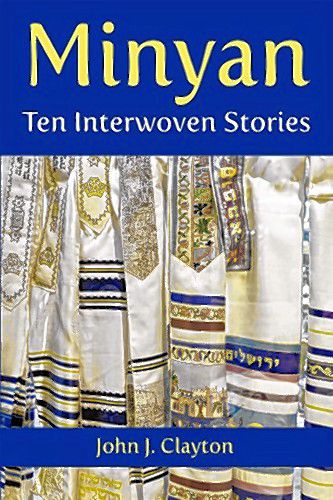Minyan
By John J. Clayton
Paragon House
johnjclayton.com
John Clayton, professor emeritus of English at the University of Massachusetts Amherst, has devoted much of his time in the last several years to writing short stories that have appeared in publications like Commentary and Missouri Review. He’s also the author of four novels, including 2011’s Mitzvah Man.
In a new story collection, Minyan, Clayton, who lives in Leverett, returns to similar subjects: Judaism, spirituality and the search for it, modern relationships and the pain and joy they can bring. The title refers to the quorum of 10 men and women over the age of 13 that’s required for traditional Jewish public worship.
The 10 interwoven stories in Minyan are all set in and around Boston and a Brookline synagogue, B’nai Shalom. It’s a portrait of a community of worshippers — friends, family and neighbors — and how their lives intersect, creating links that connect them all, for good and bad.
In the eponymous opening story, Sam Schulman, a divorced member of the congregation, begins to develop feelings for a younger single woman, Kate, who’s part of an early-morning prayer group at the synagogue. But he’s also struggling to maintain ties with his younger son, Gabe, who’s acting out his anger at his parents’ divorce: He’s joined an anti-Israeli group that may have vandalized the synagogue with graffiti.
The following story, “Children of Peace,” explores Kate’s attraction to Sam but also the dilemma she faces with her own son, Danny, who’s recently been caught shoplifting at Harvard Square. Danny seems to be responding badly to his own parents’ divorce — failed marriages are a common theme in these stories. Is it possible Sam can talk some sense into him? Or will Danny resent Sam’s involvement with Kate?
Clayton also examines his characters’ search for faith and the meaning of Jewish identity. In “A Question of Heart,” another divorcee, Tufts professor of Jewish studies Alex Konisberg is asked by a gentile colleague and friend, Barry, to talk with his 30-something daughter, Emma, who’s thinking of converting to Judaism.
Barry’s concerned that Emma’s interest in Judaism may be more a function of a broken love affair and a desire to rewrite her past. He thinks Alex, who’s known Emma since she was a college student, will be able to determine if she’s serious about converting. In fact, Barry tells Alex he’d like him to talk Emma out of this notion.
But when Alex, who’s a good decade older than Emma, begins meeting with her to discuss the tenets of Judaism, he finds himself increasingly attracted to her — and she to him. Now what? How can Barry see this as anything but a betrayal of his trust?
“John Clayton has proven once again that he is not just a master writer, but a master of breaking and mending the reader’s heart,” says one reviewer of Clayton’s new story collection. We agree.
Steve Pfarrer writes Book Bag for the Daily Hampshire Gazette. Contact him at spfarrer@gazettenet.com.



